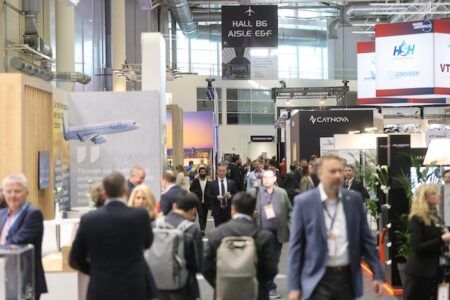Image: KLM
People the world over are becoming increasingly aware of the healthy food trend. These changing customer demands lead to a constantly evolving market, with words such as ‘organic’, ‘sustainable’ and ‘local’ becoming popular – and are airlines stepping up to meet the challenge. Industry trendsetters are now focused on providing better nutrition and intelligently sourced produce to enhance the passenger dining experience.
Setting standards
Creating healthy inflight meals begins at the menu design stage. Factors such as reduced sodium and sugars, plus the use of fresh, high-quality ingredients, are what make a meal healthier. With food safety and consistency remaining the main priorities for catering companies, it’s up to the airlines to acknowledge additional aspects such as health, flavor and freshness. Setting nutritional standards is key.
In 2009 Air Canada teamed up with Montreal-based catering consultancy Food With A Conscience to create the NutriCuisine line of onboard menu items. With a commitment to quality and a philosophy of “balanced living”, Food With A Conscience set some strict nutritional guidelines for all the NutriCuisine labelled items. These standards are followed by Air Canada’s in-house chefs and by catering partners such as LSG Sky Chefs whenever NutriCuisine items are produced throughout facilities in North America and Europe.
Food With A Conscience CEO Danielle Medina says it’s about the “passion to produce food with the quality and healthy approach that passengers are now looking for”. NutriCuisine meals contain no MSG, chemicals, butter substitutes or unnecessary preservatives. Air Canada’s most popular NutriCuisine items include a veggie sandwich in economy and sustainable seafood entrées in first.
Food With A Conscience’s pioneering approach to balanced living extends beyond nutrition and healthy eating. Sourcing sustainable foods and giving back to local communities are also important considerations. Medina adds that by working with smaller companies and local communities, “you have the opportunity to influence not only the economy of the area, but at the same time have a very high quality type of product”.
It’s all in the taste
Virgin Australia’s resident celebrity chef, Luke Mangan (Salt Grill & Sky Bar), agrees that freshness is key to healthy eating. “It’s all about using foods at their seasonal peak so you get maximum flavor, combined with lots of aromatic spices and seasonings,” he says. “Fresh herbs, different vinegars, tamarind and verjuice [a highly acidic, pressed sour fruit juice] all add extra ‘oomph’ to dishes.” Mangan also prefers to use extra-virgin olive oil and other “good oils” rather than butter.
As with Air Canada, sustainability and local sourcing is also important. Virgin Australia “always gives preference to products from the countries we’re flying from,” says Mangan. “For example, in our business class on flights from Australia, all our fish is Australian. Flying from the US we try to use American and Canadian fish.” He adds, “We won’t consider endangered fish species.”
Not only are fresh ingredients key to great-tasting healthy meals, timing is also integral. Mangan states that all of Virgin Australia’s hot meals are produced fresh at catering centers as close to flight time as possible, with nothing being frozen.
Going local
One important aspect in producing healthy inflight meals is to focus attention on the ingredients themselves. “Buy local” is a theme emerging throughout the industry, as more airlines source ingredients from small businesses, as well as supporting sustainability.
United Arab Emirates-based Etihad Airways has entered a partnership with Abu Dhabi Organics Farms, purchasing 200 free-range hens. Eggs produced by the hens are served to the airline’s first-class passengers as part of the “eggs any style” breakfast option, whereby passengers can enjoy organic eggs personalized to their taste by onboard chefs using Aero-Skillet technology from Aerolux.
Etihad has also purchased three beehives from Abu Dhabi Organics Farms. The honey produced by the bees is served to passengers and incorporated into a variety of the airline’s dishes. Etihad’s vice president of guest experience, explains, “We are thrilled to be the only airline in the world offering organic eggs and honey directly from our own locally raised hens and bees.” He also affirms Etihad’s commitment to work with “Product of the UAE” produce, saying, “Our partnership with Abu Dhabi Organics Farms is a great example of how we work together with UAE companies to bring local products to the world”.
Even the smallest airlines are joining the ‘locavore’ movement. One notable example is Kullaflyg, a tiny three-aircraft fleet airline based in Ängelholm/Helsingborg in Sweden. Kullaflyg is one of the only airlines serving a range of 100% organic meals to economy class passengers. The airline’s buy-on-board options also support area businesses; crisps are supplied by a nearby potato farm, and breads are provided by local bakeries. The airline’s community-based philosophy also extends to the company kitchen, where the inflight catering manager, Jennica Ericson, prepares meals using her own homegrown honey.
Partnering with experts
Meanwhile, airlines of all sizes are increasingly turning to culinary professionals to think outside the cardboard box and develop healthier onboard meals. These collaborations with celebrity chefs bring creative experience and signature flavors to the airlines.
One example is Air France, which teamed up with chef Christophe Reissfelder – founder of Rocchus, an organic catering, cookery and consulting firm with a focus on raw superfoods – to create the airline’s BIO (Organic) pre-order meal.
Reissfelder selects the seasonal ingredients for each BIO meal, which is farmed and produced organically. Air France offers the meal for €22 (US$30), although last-minute fliers don’t have the chance to enjoy this organic inflight experience. Air France requires a 60-day lead time for BIO (Organic) pre-orders.
According to a 2012 Diet Detective survey, Virgin America is North America’s leading airline for healthy inflight dining. The airline launched a Travel Light menu in collaboration with Gilt Taste, an online magazine and market for food lovers, helmed by former Gourmet magazine editor Ruth Reichl. Travel Light menu items curated by Gilt Taste include a roasted Portobello wrap and a tuna niçoise salad prepared with flaked albacore tuna and cage-free eggs. Diet-conscious passengers can access all Travel Light nutritional information and calorie content from their seats, using Virgin America’s Red inflight entertainment system.
Ultimately, it’s about pleasing the customer. As Virgin Australia chef Mangan explains, “We have a large number of frequent travelers, who regularly have to eat while traveling… so they want healthy meals full of flavor as well as variety.”
Farm to tray table
Korean Air, a two-time Mercury Award winner for inflight catering, exemplifies the farm-to-table movement as the world’s only airline to own and operates its own farm, Jedong Ranch, on the slopes of Mount Halla on South Korea’s Jeju Island.
The farm’s 1,700 cattle and 5,200 chickens are raised antibiotic-free on feed made with wheat, oats and corn grown on the property. Passengers can enjoy the ranch’s tomatoes, paprika and bok choy in all classes. First and business class travelers can enjoy farm-raised or local organic vegetables, breads, cereals and salads. Even the airline’s bottled water is self-sourced, from a mineral spring on Jeju Island.
All food from Jedong Ranch arrives fresh to the Incheon Airport catering center, the largest airline kitchen in Asia. By growing its own ingredients, Korean Air ensures quality and freshness in the more than 36,000 meals produced daily for its flights, and in up to 50,000 additional meals for other carriers.
Submitted by Elyse Pasquale, a food and travel journalist
You can follow Elyse on Twitter @foodieintl
Or on her website: foodieinternational.com




